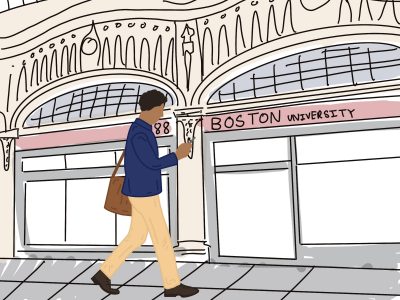The other night while walking down Commonwealth Avenue, I passed by a man smoking on a bench. “Damn, you really aren’t in a rush, are you?” he asked me with amusement.
Trust me, you have to be walking really slowly for a stranger to comment on it.
Though I now walk at an excruciatingly slow pace, I used to be what I’m coining a “city-stomper.”
A “city-stomper” is a pedestrian who angrily weeds through the sidewalk masses — one who walks not out of enjoyment for the act itself but only to reach a certain destination as quickly as possible.
My haste came to a halt when I sprained both my ankles at the beginning of last semester. With a boot on one ankle and an ACE bandage on the other, my speedy walks were regrettably reduced to slow hobbles.
After my physical therapist cleared me to walk, I set out on foot — or more accurately, boot — with no destination. It was during this period of partial incapacitation that I learned how much passed me by when I used to rush everywhere. As I inched my way down Marlborough Avenue, sensations became pronounced in a way I’d never experienced.
In “A Philosophy of Walking,” Frederic Gros attributes slowness as one of the key characteristics of a fulfilling walk. “When you are walking [slowly], nothing really moves: it is rather that presence is slowly established in the body,” he writes. In this state of mind, the surroundings become “a set of tastes, colors, scents which the body absorbs.”
Sometimes we rush because we can’t afford to be late, or because the city streets aren’t all that pleasant and we’d rather hurry back to our place of respite. Whether we’re walking to an important interview or meandering around Boston Common, our destination surely impacts our strides. However, I’d argue that intentional slowness is something we lack and desperately need, regardless of our ultimate end.

Our sense of time quickens as we age. This is partially attributed to the way we process novelty. When we encounter something novel, our perception of time slows down so we can absorb all that is new.
As we get older, we have fewer novel experiences, and time seems to go faster.
Gros addresses this temporal dimension, attesting that “days of slow walking make you live longer, because you have allowed every hour, every minute, every second to breathe, to deepen.”
No, there isn’t a proven causal relationship between slow walks and longer lives. If anything, there’s ample research that associates a fast pace with a longer life.
Maybe I should reframe — life feels longer when you walk slower.
When you walk slowly, time ebbs just enough that the act of putting one foot in front of the other becomes a conscious mechanical process. It’s like when you become aware of your breath. It’s an invigorating, visceral reminder that you are alive.
We’re always searching for ways to be more productive, how to do more in less time. If we’re going to set aside an hour to walk, shouldn’t we strive to get more steps in? In general, isn’t it better to do more than to do less?
The crux of this dilemma is that it falsely equates doing with being. We want to live longer so that we can do more. But slowing down allows us to simply be.
Perhaps more than slowness, it is the state of being that we neglect when we rush through our days.
That’s the magic of the slow walk — you are focused on being, not doing, and through this effort time stretches out. You become present in yourself, your surroundings and your place within the latter.
I don’t know what the secret to living longer is, but I’d venture that I do know the secret to tricking yourself into the perception of living longer. Put on some boots and a solid winter coat, and head out with no destination. Walk slowly, extract the new from the familiar, and feel the minutes expand.














































































































